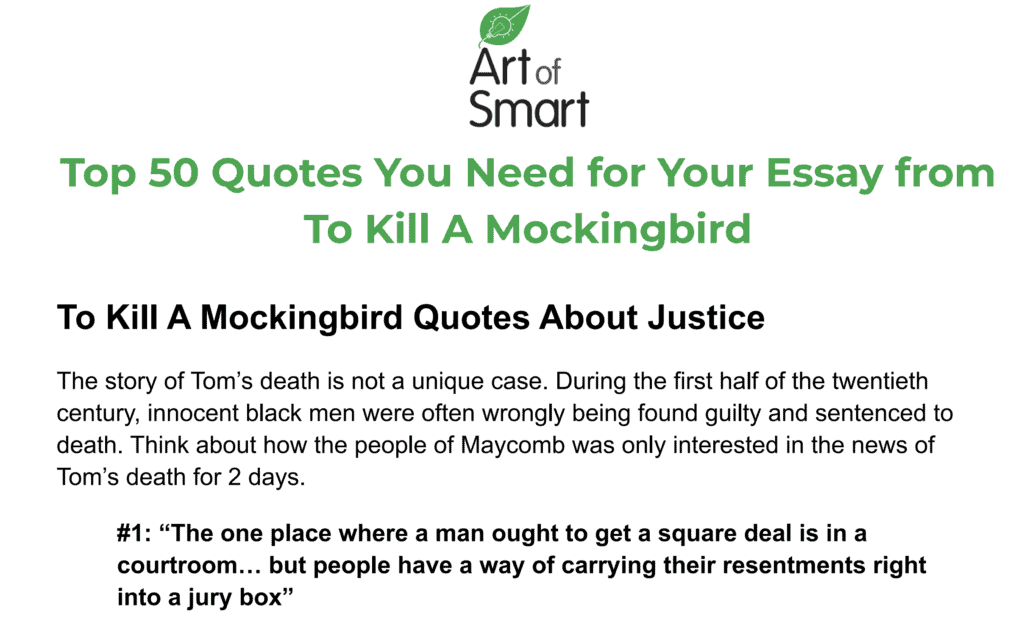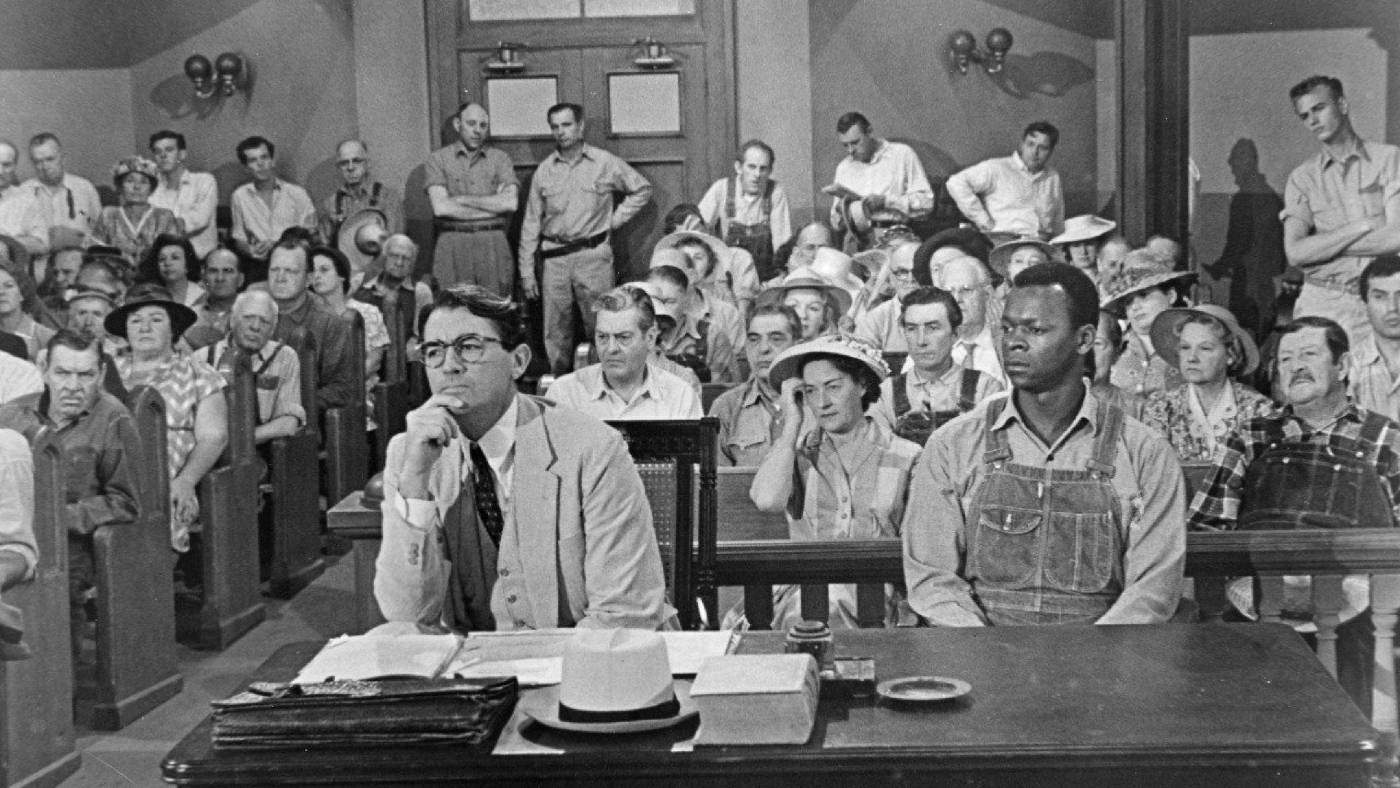Looking for a handy-dandy cheat sheet of quotes to help you with the English essay you’ve got due tomorrow for To Kill a Mockingbird?
Fret not! We have compiled 50+ quotes from To Kill a Mockingbird arranged by theme to help you with your essay and get the ball rolling.
Top tip: When analysing quotes from To Kill a Mockingbird, remember that these quotes are from the novel so you’ll need to look at various literary techniques.
Check them out below!
To Kill A Mockingbird Quotes About Justice
To Kill A Mockingbird Quotes About Power and Prejudice
Atticus Finch Quotes
Quotes About Boo Radley
Tom Robinson Quotes
To Kill A Mockingbird Quotes — Empathy and Bravery
To Kill A Mockingbird Quotes About Class
Bob Ewell Quotes
Scout Quotes
To Kill A Mockingbird Quotes About Loss of Innocence
To Kill A Mockingbird Quotes About Justice
The story of Tom’s death is not a unique case. During the first half of the twentieth century, innocent black men were often wrongly being found guilty and sentenced to death. Think about how the people of Maycomb was only interested in the news of Tom’s death for 2 days.
#1: “The one place where a man ought to get a square deal is in a courtroom… but people have a way of carrying their resentments right into a jury box”
- Characters: Atticus
- Technique: metaphor
- Chapter 23
#2: “I waited and waited to see you all come down the sidewalk, and as I waited I thought, Atticus Finch won’t win, he can’t win, but he’s the only man… who can keep a jury out so long”
- Characters: Miss Maudie, to Scout and Jem
- Technique: repetition, emphasis, epiphora
- Chapter 22
#3: “Gentleman, a court is no better than each man of you sitting before me on this jury. A court is only as sound as its jury, and a jury is only as sound as the men who make it up.”
- Characters: Atticus, addressing the jury
- Techniques: Second person, anaphora, allusion, breaking the fourth wall
- Chapter 20
Analysis:
Essentially, Atticus Finch reminds each one of the jury has a choice to uphold the integrity and fairness of the court. This quote shows Atticus’s strong moral compass and persuasive power that he holds to the jury.
The use of second person collective in Atticus’ speech is empowering to the jury with the emphasis of “each of you” emphasizes the equal importance of each jury member to the court. This is further evoked by the allusion “gentleman” which sets his expectation of decorum and fairness.
The alternating repetition of the word “jury” and “court” hammers down the idea of how the court is not an independent institution above the people, but instead is dependent on the actions of the individual. The repetition of the similie “only as sound as” is persuasive as it motivates the jury to strengthen their morals, rather than bending down to their biases.
#4: “Don’t see how any jury could convict on what we heard”
- Character: Jem
- Technique: Imperative, declarative tone, first person inclusive
- Chapter 21
#5: “You never stopped to gimme a chance to tell you my side of it — you just lit right into me”
- Character: Scout, to Uncle Jack
- Technique: dialogue, colloquial language, indignant tone
- Chapter 9
#6: “We know all men are not created equal in the sense some people would have us believe- some people are smarter than others, some people have more opportunity because they’re born with it, some men make more money than others, some ladies make better cakes than others… But there is one way in this country in which all men have been created equal… That institution, gentlemen, is a court.”
- Character: Atticus
- Technique: repetition, cumulative listing, inclusive language and allusion
- Chapter 20
#7: “Look at all those folks, it’s like a Roman carnival”
- Character: Miss Maudie
- Technique: metaphor, irony in referring to the Court as a “carnival”
- Chapter 16
#8: “‘Did it ever strike you that Judge Taylor naming Atticus to defend that boy was no accident? That Judge Taylor might have had his reasons for naming him?’”
- Character: Miss Maudie
- Technique: Rhetorical question, ambiguity
- Chapter 22
Analysis:
Miss Maudie suggests that Judge Taylor had a specific motive to naming Atticus Finch to defend Tom Robinson. She implies that Judge Taylor knew that Atticus would not be prejudiced against Tom Robinson — to the extent that Judge Taylor wished a certain outcome for the court case.
The use of a rhetorical question excellently creates a sense of engagement and encourages the reader to think about the implications of the question.
There is also ambiguity in Miss Maudie’s statement as the intentions of Judie Taylor is open to multiple interpretations, and whether they were good or bad.
To Kill A Mockingbird Quotes About Power and Prejudice
This novel incorporates a lot of references to eyes, sight and blindness. This is no coincidence! It’s a metaphor that shows the town’s racist misjudgment and prejudice.
An important example is Atticus’s and Mayella’s right eyes. While Atticus uses his right eye to “whenever he wanted to see something well, he turned his head and looked from his right eye”, Mayella (who accuses Tom of sexually assaulting her) is bruised.
Make sure to take notice of the perception metaphor when exploring quotes on power and prejudice!
#9: “I think there’s just one kind of folks. Folks.”
- Characters: Scout, to Jem
- Technique: repetition, truncated sentence
- Chapter 23
#10: “Cry about the simple hell people give other people… Cry about the hell white people give coloured folks”
- Characters: Raymond, to Scout
- Technique: anaphora, repetition, imperatives
- Chapter 20
#11: “Whenever a white man does that to a black man, no matter who he is, how rich he is, or how fine a family he comes from, that white man is trash.”
- Technique: repetition, declarative tone, imperative
- Chapter 23
#12: “Grown folks don’t have hidin’ places”
- Character: Jem
- Technique: irony, allusion
- Chapter 4
#13: “Around here once you have one drop of N**** blood, that makes you all black”
- Character: Jem
- Technique: synecdoche
- Chapter 16
#14: “The hell white people give coloured folks, without even stopping to think they’re people, too”
- Character: Dolphus Raymond
- Technique: juxtaposition, dichotomy
- Chapter 20
#15: “likened Tom’s death to the senseless slaughter of songbirds by hunters and children.”
- Character: Mr Underwood
- Technique: symbolism, emotive language, sibilance
- Chapter 25
Analysis:
The quote “likened Tom’s death to the senseless slaughter of songbirds by hunters and children” is a comparison that emphasises the avoidable tragedy of Tom’s death.
The symbolism of the songbirds is compared to the beauty and innocence of Tom’s life, and demonstrates the mindless destruction of his life at the ignorant hands of “hunters and children”.
Emotive language is used in the words “senseless slaughter” and “songbirds” to evoke feelings of sadness and loss. It implies that the death of Tom was caused by the actions of others, and that Tom was not at fault.
Finally, sibilance is used to create poetic and songlike touch to the quote, which befits the recurring metaphor of the mockingbird.
Atticus Finch Quotes
Atticus Finch is the only person who treats all people equally. He is a virtuous lawyer, who insists on telling the truth no matter what. But he is also more complex than a “just man” — he goes against his principle of “always tell the truth” and lies to protect Boo Radley.
#16: “Remember it’s a sin to kill a mockingbird.”
- Characters: Atticus, Scout
- Technique: symbolism, motif
- Chapter 10
#17: “Atticus tried to stifle a smile but didn’t make it. ‘No, we don’t have mobs and that nonsense in Maycomb”
- Characters: Atticus
- Technique: foreshadowing, comforting tone
- Chapter 15
#18: “A mob’s always made up of people, no matter what. Mr Cunningham was part of a mob last night but he was still a man”
- Characters: Atticus, to Scout
- Technique: anonymity, emphasis, firm tone
- Chapter 16
#19: “‘You know the truth, and the truth is this: some N****es lie, some N****es are immoral, some N**** men are not to be trusted around women—black or white. But this is a truth that applies to the human race and to no particular race of men.’”
- Characters: Atticus, addressing the jury
- Technique: second person, repetition, declarative tone
- Chapter 20
#20: “Those are twelve reasonable men in everyday life, Tom’s jury, but you saw something come between them and reason. You saw the same thing that night in front of the jail.”
- Characters: Atticus
- Technique: anaphora
- Chapter 23
Analysis:
The quote reprimands about the actions of the jury. Atticus comments that though the jury are “reasonable men” in everyday life, but suggests that the presence of Tom Robinson, an African American man, deters them from reason. The jury’s biases prevent them from making a fair and just decision in the trial, as well as the events that occurred in front of the jail.
The anaphora “you saw the same thing” emphasises the idea that this is not a one-time occurrence and it is something more insidious. The prejudice against Tom Robinson and black Americans is rooted in everyday life.
#21: “There were other ways of making people into ghosts”
- Character: Atticus
- Technique: metaphor, exaggeration
- Chapter 1
#22: “In certain circumstances, the common folk judiciously allowed them certain privileges by the simple method of becoming blind to some of the Ewells’ activities”
- Character: Atticus, to Scout
- Technique: foreshadowing
- Chapter 3
#23: “‘she has merely broken a rigid and time-honored code of our society, a code so severe that whoever breaks it is hounded from our midst as unfit to live with. . . . What did she do? She tempted a N****.'”
- Character: Atticus, about Mayella Ewell
- Technique: rhetorical question, metaphor, exaggeration
- Chapter 20
#24: “when it’s a white man’s word against a black man’s, the white man always wins.”
- Character: Atticus, to Jem
- Technique: contrast, repetition
- Chapter 23
Quotes about Boo Radley
#25: “I think I’m beginning to understand why Boo Radley’s stayed shut up in the house all this time… it’s because he wants to stay inside”
- Characters: Jem
- Technique: reflective tone, epiphany, symbol of Jem maturing, foreshadowing
- Chapter 23
Analysis:
This quote suggests that Scout is beginning to understand and empathize with the reclusive character of Boo Radley.
Boo Radley is used as a symbol of the prejudices that exist in the town of Maycomb. Scout’s realisation that Boo is not the monster she thought he was is telling of Scout’s growing empathy to the so-called “outsiders” of Maycomb.
This foreshadows Scout’s eventual understanding of Boo, as well as her growing awareness of the prejudices in her community.
#26: “So many things had happened to us, Boo Radley was the least of our fears.”
- Characters: Scout
- Technique: contrast, hyperbole
- Chapter 26
Analysis:
The quote reflects on how Scout and Maycomb’s perception of Boo Radley, has changed over time. At the beginning of the novel, the children in the neighborhood, including Scout, are terrified of him. But, the story progresses and the harrowing trial of Tom Robinson has taught them to put things in perspective.
The phrase “least of our fears” is a hyperbole. It exaggerates the idea that the “fear” of Boo Radley is insignificant against everything else that has happened.
The quote also uses contrast to demonstrate between the cruelty of Maycomb’s citizens and Boo Radley who is revealed to be a kind and innocent recluse misunderstood by the community.
Tom Robinson Quotes
#27: “‘Tom Robinson’s case, is something that goes to the essence of a man’s conscience – Scout, I couldn’t go to church and worship God if I didn’t try to help that man.’”
- Character: Atticus
- Technique: patient tone, dialogue, moral appeal
- Chapter 11
#28: “He would not have dared strike a white woman under any circumstances and expect to live long, so he took the first opportunity to run – a sure sign of guilt”
- Character: Atticus, about Tom Robinson
- Technique: irony
- Chapter 19
#29: “Atticus had used every tool available to free men to save Tom Robinson, but in the secret courts of men’s hearts Atticus had no case. Tom was a dead man the minute Mayella Ewell opened her mouth and screamed.“
- Characters: Scout
- Technique: allusion, synecdoche, metaphor, irony, personification
- Chapter 25
Analysis:
This quote demonstrates the futility of Maycomb’s court system to support tom Robinson. Despite Atticus using all his legal skill to support Tom’s case and innocence, the outcome of the trial was predetermined by the racism of the jury and the community.
The metaphor “secret courts of men’s hearts” refers to the prejudices of the jury and Maycomb community. Despite the supposed equality of the legal system, the idea of justice is overruled by the racial biases festering in Maycomb.
The personifiction of “men’s hearts quotes” emphasises the power of men’s hearts. It suggests that the rawest emotions and desires of men have the ability to sway trials and judgments.
This evokes a sense of irony as Atticus’s efforts were useless against the “secret courts of men’s hearts” despite the court being a seemingly “legal” case.
To Kill A Mockingbird Quotes — Empathy and Bravery
#30: “You never really understand a person until you consider things from his point of view… until you climb into his skin and walk around in it”
- Characters: Atticus, Scout and Jem
- Technique: metaphor
- Chapter 3
#31: “Atticus, he, was real nice”… “Most people are, Scout, when you finally see them”
- Characters: Atticus, Scout
- Technique: dialogue, conversational tone, reflective tone
- Chapter 31
#32: “I wanted you to see what real courage is, instead of getting the idea that courage is a man with a gun in his hand. It’s when you know you’re licked before you begin, but you begin anyway and see it through no matter what”
- Characters: Atticus, about Mrs Dubose
- Technique: contrast, colloquial language, antithesis, symbolism
- Chapter 11
Analysis:
The quote is about the nature of courage, and the idea that it is not simply about physical strength or the ability to use a weapon. Rather, it explores the determination and willpower to face a difficult situation even when the odds are against you.
Firstly, the symbolism of “man with a gun in his hand” assesses the external, superficial, and violent idea of courage that the speaker wants to contrast with the internal and moral idea of courage.
The quote is based on the anthesis between the idea of courage being a man with a gun in his hand and the idea of real courage being something more human. It adds to the characterisation of Atticus, who is known for his moral fortitude, and for his willingness to stand up for what is right, even when it is difficult.
#33: “‘Scout, simply by the nature of the work, every lawyer gets at least one case in his lifetime that affects him personally… you might hear something ugly about it at school, but do one thing for me if you will: you just hold your head high and keep those fists down”
- Characters: Atticus, to Scout
- Technique: imperative, antithesis, dialogue
- Chapter 9
#34: “According to her views, she died beholden to nothing and nobody. She was the bravest person I ever knew.”
- Characters: Atticus, about Mrs Dubose
- Technique: alliteration, reflective tone
- Chapter 11
#35: “How could they do it, how could they?”
- Characters: Jem, to Atticus
- Technique: repetition, rhetorical question
- Chapter 22
#36: “Boo was our neighbour. He gave us two soap dolls, a broken watch and chain, a pair of good-luck pennies, and our lives. But neighbours give in return. We never put back into the tree what we took out of it: we had given him nothing, and it made me sad.”
- Characters: Scout
- Technique: listing, truncated sentence, reflective tone
- Chapter 31
#37: “Accustomed to our father’s last-will-and-testament diction, and we were at all times free to interrupt Atticus for a translation when it was beyond our understanding”
- Characters: Scout
- Technique: humorous tone
- Chapter 3
To Kill A Mockingbird Quotes About Class
#38: “‘There’s some folks who don’t eat like us,’ she whispered fiercely, ‘but you ain’t called on to contradict ‘em at the table when they don’t. That boy’s yo’ comp’ny and if he wants to eat up the table cloth you let him, you hear?’”
- Characters: Calpurnia, to Scout
- Technique: rhetorical question, imperative, colloquial language
- Chapter 2
#39: “I don’t think the children have suffered one bit from having her brought them up. If anything, she’s been harder on them in some ways than a mother would have”
- Character: Atticus, about Calpurnia
- Technique: dialogue, firm tone
- Chapter 14
Bob Ewell Quotes
#40: “They’re dangerous to live around ‘sides devaluin’ my property”
- Character: Bob Ewell
- Technique: irony, absurdity
- Chapter 17
Scout Quotes
#41: “It was a time of vague optimism for some of the people: Maycomb County had recently been told that it had nothing to fear but fear itself”
- Characters: Scout
- Technique: cultural allusion, authoritative tone, declarative statement
- Chapter 1
Analysis:
The quote “It was a time of vague optimism for some of the people: Maycomb County had recently been told that it had nothing to fear but fear itself” reflects on the atmosphere in the fictional town of Maycomb.
The quote is a cultural reference to a famous line from Franklin D. Roosevelt’s first inaugural address, “the only thing we have to fear is fear itself.” Here, Roosevelt was trying to inspire the American people during the Great Depression and the Dust Bowl.
The quote creates a mood of confusion and uncertainty. The phrase “vague optimism” suggests that the people of Maycomb County are not entirely sure why they feel optimistic or what they are optimistic about.
#42: “He’s a Cunningham”
- Characters: Scout, to Miss Maudie
- Technique: Truncated sentence, declaration
- Chapter 3
#43: “white people wouldn’t have anything to do with her because she lived among pigs; N****es wouldn’t have anything to do with her because she was white.”
- Character: Scout, about Mayella Ewell
- Technique: antithesis, repetition
- Chapter 19
To Kill A Mockingbird Quotes About Loss of Innocence
#44: “When a child asks you something… don’t make a production out of it. Children are children, but they can spot an evasion quicker than adults, and evasion simply muddles them”
- Characters: Atticus
- Technique: Imperative, repetition, aphorism
- Chapter 9
#45: “It’s not time to worry yet”
- Characters: Atticus, to Scout
- Technique: Imperative, phrase is repeated throughout the book
- Chapter 11, 22
#46: “Mockingbirds don’t do one thing but make music for us to enjoy. They don’t eat up people’s gardens, don’t nest in corncribs, they don’t do one thing but sing their hearts out for us.”
- Characters: Miss Maudie, to Scout
- Technique: synecdoche, metaphor, motif
- Chapter 10
#47: “‘You are too young to understand it,’ she said, ‘but sometimes the Bible in the hand of one man is worse than a whiskey bottle in the hand of- oh, of your father.’”
- Technique: juxtaposition, subversion
- Chapter 5
#48: “They’ve done it before and they did it tonight and they’ll do it again and when they do it, it seems that only children weep.”
- Characters: Atticus, to Jem
- Technique: shifting tense, tricolon
- Chapter 22
#49: The world’s ending’, Atticus! Please do something!”
- Characters: Scout, to Atticus
- Technique: foreshadowing, exclamation, symbolism
- Chapter 8
#50: “Just as the birds know where to go when it rains, I knew when there was trouble in our street”
- Characters: Scout
- Technique: metaphor, motif of birds, foreshadowing
- Chapter 8
#51 (bonus!): “Doesn’t make it right,” said Jem stolidly. He beat his fist softly on his knee. “You can’t just convict a man on evidence like that – you can’t”
- Characters: Jem
- Technique: repetition, body language
- Chapter 23
On the hunt for quotes from other texts?
Check out our list of quotes for the following texts:
- The Merchant of Venice
- Frankenstein
- Lord of the Flies
- Blade Runner
- Hamlet
- Pride and Prejudice
- Never Let Me Go
- Burial Rites
- TS Eliot Poetry
- King Lear
Are you looking for some extra help with your To Kill a Mockingbird analysis of quotes?
We have an incredible team of English tutors and mentors!
We can help you master your analysis of To Kill a Mockingbird by taking you through the summary, key characters, quotes and themes. We’ll also help you ace your upcoming English assessments with personalised lessons conducted one-on-one in your home or online!
We’ve supported over 8,000 students over the last 11 years, and on average our students score mark improvements of over 20%!
To find out more and get started with an inspirational English tutor and mentor, get in touch today or give us a ring on 1300 267 888!
Tiffany Fong is currently completing a double degree in Media and Communications with Law at Macquarie University. She currently contributes to the university zine, Grapeshot where she enjoys writing feature articles, commentary on current affairs or whatever weird interest that has taken over her mind during that month. During her spare time, Tiffany enjoys reading, writing, taking care of her plants or cuddling with her two dogs.









